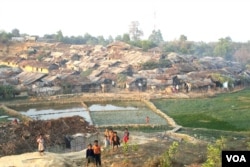Rohingya Muslims who have sought refuge in Bangladesh say they are desperate to stop living as refugees and return to their homeland in Myanmar.
“The Rohingyas have been seeking temporary shelter in Bangladesh only to save their lives from a genocide-like situation in Myanmar. For most of us, life as refugees is very hard in Bangladesh. Arakan (Rakhine), where our Rohingya community has lived for centuries, is our ancestral homeland. We want to go back to Arakan,” said Mohammad Shaker, a Rohingya leader in the Cox’s Bazar district of Bangladesh.
Nurul Islam, a Britain-based Rohingya rights activist and community leader, said whenever anti-Rohingya violence erupts in Myanmar, the international community has taken a keen interest to see that they get safe passage to other countries. But he alleges outside powers do not follow up to help the refugees return to their homeland.
“It appears many in the international community think if all Rohingyas are evacuated from Myanmar, the problem of our community will be solved. They are wrong,” said Islam, chairman of Arakan Rohingya National Organization. “The Rohingya crisis will never be resolved until our community members are able to return to their homeland in Arakan.”
Long-standing problem
Since the Rohingya Muslims were first targeted by large-scale ethnic violence in 1978, the religious minority community has fled persecution and economic hardship in Myanmar by leaving for Bangladesh and other countries.
Currently, there are up to half a million Rohingyas in Bangladesh, with over 90 percent of them living as illegal refugees, mostly in decrepit shanty-colonies scattered across southeastern Bangladesh.
With no support from the Bangladesh government or the UN refugee agency (UNHCR), most of the refugees do menial jobs, have no access to basic services, and live hand-to-mouth.
Most complain that in Bangladesh their life is full of hardship and their life back in Myanmar was more comfortable.
“After the Rakhine Buddhists burnt my house, with my two children and wife I fled to Bangladesh four years ago. I do odd day-wage jobs to support my family. Often I go without job. I live in a ramshackle shack and I think I can never escape this life of poverty here,” said Mohammad Ismail, a 38-year-old Rohingya. “I had my own farmland, I also owned a shop and I was quite well-off. If the situation there changes I want to return to Arakan.”
Current crisis
Since a Myanmar military crackdown began in Rakhine state seven weeks ago following the killing of 9 policemen in an armed attack blamed on Rohingya militants, several thousands more Rohingya men, women and children have landed in Bangladesh.
Bangladesh’s home minister Asaduzzaman Khan Kamal said that “on humanitarian ground” some of the Rohingyas fleeing the current violence have been provided refuge.
“We shall try to host these people as long as possible. Then we shall start a dialogue with Myanmar so that they can return to their home. We hope Myanmar will take them back, eventually,” Kamal said.
But Rohingya community leader Islam alleged the ongoing violence against the Rohingyas in Rakhine is “state-sponsored.”
“The Burmese security forces are entering the Rohingya villages and indulging in killings, rape and arson in ways as violent as possible, as we have seen in the past weeks. This level of indescribable torture is aimed at terrifying the entire community to an extreme level so that all Rohingyas flee the country,” Islam told VOA. “No Rohingya refugee can dare return to Burma in such situation. But, the final line from us is that we want to return to our homeland in Arakan.”
Investigations and pressure
The Myanmar government has said it is setting up a “national level committee” to investigate conditions and allegations of abuses amid international pressure about rising violence and a humanitarian crisis in northern Rakhine state.
Although the current government has said little else about the current situation, it has long denied allegations of abuse and persecution. For decades, Myanmar officials have said most the Rohingya are recent migrants from Bangladesh, and the government generally refers to them as Bengali.
Myanmar’s state counselor and democracy icon Aung San Suu Kyi has faced growing criticism for failing to tackle the violence, as the military campaign has triggered the displacement of tens of thousands.
The committee follows on the Rakhine State Advisory Commission, in place since August, under former United Nations Secretary General Kofi Annan, who recently expressed “deep concern” over violence.
Penny Green, a professor of law and globalization at Queen Mary University of London (QMUL) said as long as institutionalized discrimination, widespread and state sanctioned hate crime and segregation characterize life for the Rohingya in Myanmar, they will continue to flee Myanmar.
“The voluntary return of the Rohingya refugees to Myanmar will only be possible if Myanmar confronts its genocidal crimes, punishes perpetrators and restores full civil, economic, social and political rights to the Rohingya,” said Green, who is the director of QMUL’s International State Crime Initiative.
She said pressure must be brought to bear on Aung San Suu Kyi’s government.
"Sanctions, boycotts and divestment have been successful in confronting some of the world’s worst state crimes. We should all be urging our own governments not to engage with the Myanmar government until it ceases its genocidal practices,” she said.





